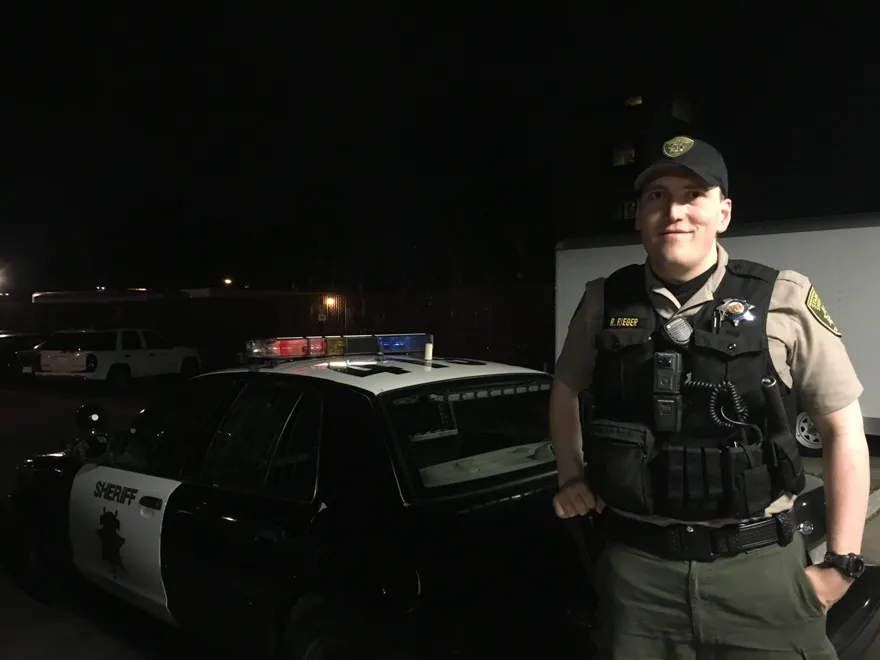Aiming to promote community education and engagement amid a growing awareness of police brutality nationwide, the Stanford University Department of Public Safety (SUDPS) has a standing offer for students to join deputy police officers for “ride-alongs” in their vehicles. Last Thursday, the Daily went on such a ride with deputy Rob Rieger.
Rieger, who has worked at the SUDPS for the past year and a half, patrols Stanford’s campus between 6:30 p.m. and 4:30 a.m. most nights.
In the midst of national conversations about policing and police brutality, Rieger says, he and SUDPS are actively trying to establish lines of communication between the police and the community.
“We want to build the relationship, and not turn into an adversarial us-versus-them,” he said. “It’s very important for us to take every opportunity we have to show [that] we are going to be lenient and lean towards the education side of things.”
On the job, some of the routine stops Rieger makes involve citing cyclists for traffic violations, such as continuing through stop signs or biking without a bike light.
But sometimes, Rieger faces unique scenarios. Last Thursday, for instance, he was called to a dormitory where two students had begun to panic after taking edible marijuana gummies. After arriving on the scene, Rieger and two other deputies stood back as medics helped the students.
According to Rieger, it wasn’t his role to arrest students for violating any laws — he was there to make sure nothing violent occured.
“It’s not like Groundhog Day, day after day,” he said. “There are different calls every day. You have to keep learning, and you have to keep training.”
But not all students are entirely comfortable with campus police.
“If it’s nighttime, I’m more on edge — even if I’m doing nothing wrong at all,” said Les Levy ’21. “Being stopped by a cop at night is not something I’d ever be comfortable with, mainly because I have no power. I’m just a student, they’re a cop.”
However, Rieger said that SUDPS prioritizes engaging with the campus community and making sure that people have positive interactions with law enforcement.
For instance, while on duty, Rieger wears a heavy vest filled with not just traditional tools for the job — including a notebook of citation codes and a body camera — but also stickers to hand out to children.
“It’s a great way to break the ice between us and the community,” he said.
Rieger, a recent Sacramento State graduate, said that he understands the dynamics of university life, like underage drinking, and aims to focus less on punitive measures and more on education — so long as the person he’s talking to is cooperative and truthful.
“We’re not naïve, and know undergrads are going to use alcohol and they’re going to possess it,” he said. “So I’m very big on the education portion of it — since you’ve been cooperative, or you have told me the truth, I’m going to work with you and give you a warning and hopefully that is a way of building a bond between us.”
For Rieger, a large part of the reason he started policing to begin with was to serve the community and change it for the better.
“You turn on the TV, and you see cops doing terrible things, making horrible decisions. A lot of people are like — why would you want to get into that?” Rieger said. “[But] I’m going to try my best to be part of the change, to improve.”
Part of that improvement means doing more than punishing people who violate statutes.
“Obviously we are law enforcement, and there are times when someone is breaking the law and we have to arrest [them], but a lot of what we do is help people,” Rieger said.
SUDPS is also working to broaden their community engagement. Right now, any student can go on a ‘ride-along’ with a deputy, and many deputies go to dorms to engage in community discussion. A few weeks ago, Deputy Emerson Stewart went to the freshman dorm Arroyo to talk with students about policing, both at Stanford and in America at large.
“[He] came here from a position of power and gave us the floor to talk about our concerns with police,” said Kevin Liao ’21, an Arroyo resident who was part of the discussion with Stewart.
During the talk, students asked questions on a variety of topics, including the ins and outs of being a police officer, police brutality and racial profiling.
“I thought it was really eye opening to see a perspective from the other side,” said Levy, who was also present at the discussion. “It was nice to hear that he hears our issues and he agrees that there are issues and we need to change them.”
SUDPS also has a community police academy course which students can take for 1 unit in winter quarter.
Last winter, Rieger talked to the class about differences between media portrayals of police and the reality of policing. Students also learn about crime scene investigation, how 911 calls work and more.
Rieger hopes that students who are apprehensive of the police take the opportunity to open lines of communication with deputies on campus.
“Whatever concerns or frustrations you have, start a dialogue. That way, I can I explain to you , this is how I would have handled [whatever incident], these are our goals as a department,” said Rieger. “Ideally, I would take a member of our community out on a ride along every night.”
Contact Adesuwa Agbonile at adesuwaa ‘at’ stanford.edu.
